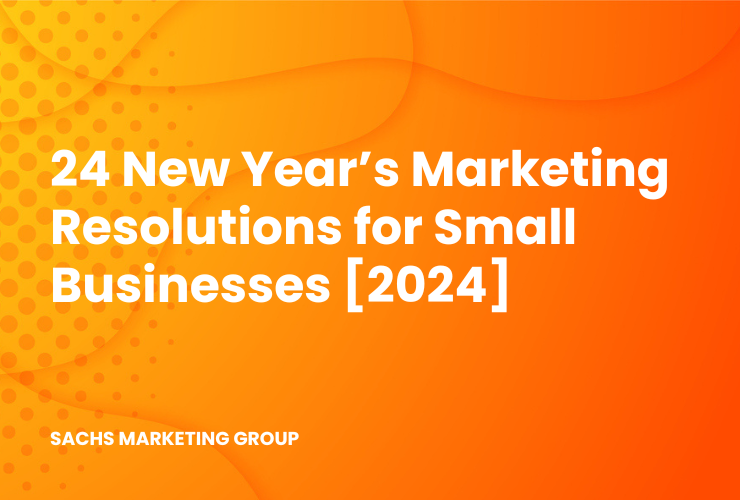In the dynamic world of digital marketing, setting New Year’s resolutions can be a game-changer for small businesses. It’s a chance to refresh strategies, adopt new technologies, and stay ahead of the curve, ensuring your business remains competitive and relevant.
The start of a new year symbolizes new beginnings and opportunities, especially for small businesses looking to make a mark in the digital world.
Establishing New Year’s digital marketing resolutions can catalyze growth and innovation.
In this article, we share 24 New Year’s marketing resolutions for small business owners interested in thriving in 2024.
Overview
New Year’s Marketing Resolutions
A new year brings new marketing opportunities and challenges. It’s the perfect time for small businesses to reassess their strategies and set ambitious yet achievable goals.
Here are 24 New Year’s marketing resolutions for small businesses.
1. SEO: Refresh Your Keyword Research
In 2024, refreshing your keyword research is crucial for staying relevant in the ever-evolving landscape of search engine optimization.
Start by analyzing current trends, understanding customer language, and identifying new search queries in your industry. Utilize advanced tools like Ahrefs or Semrush to discover keywords your competitors might need to include.
Effective keyword research isn’t just about finding high-volume terms – it’s about finding the best keywords for your target audience. This research will lay the groundwork for all your SEO efforts, ensuring your content and strategies resonate with your audience’s interests and needs.
2. SEO: Improve Target Keyword Rankings
Improving your rankings for targeted keywords is a multifaceted process. It begins with optimizing existing content and extends to creating new, high-quality content centered around these keywords.
Focus on integrating keywords naturally, enhancing meta tags, headers, and URLs for better relevance. Link-building plays a crucial role here; acquire backlinks from reputable sites to boost authority.
Regularly monitor your rankings using tools like Ahrefs or Moz, and be prepared to adjust your strategy based on search engine algorithm updates.
Improving keyword rankings is a continuous effort that requires patience and persistence.
3. SEO: Increase Organic Website Traffic
Increasing organic website traffic is a fundamental goal for any small business. Start by creating high-quality, relevant content that answers your audience’s queries and needs.
Employ on-page SEO tactics such as optimizing headings, meta descriptions, and images to make your site more search-engine friendly. Off-page SEO, including building backlinks from trusted sites, also plays a key role. Engage in local SEO if your business is location-specific. Don’t forget to leverage social media to drive traffic back to your website.
Continuous analysis and adjustment of your strategy based on website analytics are essential to ensure ongoing improvement in organic traffic.
4. SEO: Optimize for AI Search
Artificial intelligence (AI) exploded onto the scene in recent years, and we expect it to continue to shape the digital marketing landscape this year. It’s one of the top 2024 digital marketing trends we recommend exploring.
Optimizing for AI search in 2024 involves understanding how artificial intelligence and machine learning are changing search algorithms.
Focus on creating conversational, natural-sounding content that aligns with voice search and conversational queries. Structuring your content for featured snippets or position zero in search results can also be beneficial.
Ensure your website’s structure and schema markup are AI-friendly, making it easier for search engines to crawl and understand your content.
Stay updated with the latest AI trends in search, like Google’s Search Generative Experience, which is rumored to roll out this year, and how small businesses are using OpenAI and Gemini.
5. Social Media: Increase Social Media Engagement
Increasing social media engagement in 2024 means creating content that resonates with your audience and encourages interaction.
Focus on understanding what your audience values and tailor your content accordingly. Use a mix of posts to spark conversations, including images, videos, polls, and questions. Engage actively with your audience by responding to comments and messages promptly. Also, consider leveraging user-generated content to build community and trust.
Regularly analyzing your engagement metrics will help you understand what types of content work best, allowing you to refine your strategy for even greater engagement.
Related: How to Measure Social Media Marketing Success
6. Social Media: Increase Organic Reach
To increase organic reach on social media, it’s essential to understand the algorithms of each platform.
Create high-quality, shareable content that aligns with the interests and needs of your target audience. Utilize relevant hashtags to enhance visibility and participate in trending topics or challenges. Consistency is critical – post regularly but maintain quality.
Collaborating with influencers or other brands can also amplify your reach. Remember, each social media platform has unique nuances, so tailor your content and engagement strategy to maximize organic reach.
Focused on Instagram? Here’s how to increase visibility on Instagram (and grow your audience)
7. Social Media: Improve Conversion Rate
Improving your social media conversion rate requires a strategic approach that combines engaging content with clear calls-to-action (CTAs).
Ensure your social media profiles are optimized with up-to-date information and easy-to-find contact details or links to your website. Use targeted advertising to reach potential customers who are most likely to convert. Create compelling, value-driven content that leads to a landing page designed for conversion.
Regularly test elements like ad copy, images, and CTAs to see what resonates best with your audience. Tracking and analyzing your conversion metrics will guide you in fine-tuning your strategy for optimal results.
8. Social Media: Attract Organic Mentions
Attracting organic mentions on social media involves building a robust and engaged community around your brand.
Encourage your followers to share their experiences with your products or services. Hosting contests or challenges that prompt users to mention your brand can be effective. Collaborate with influencers who align with your brand values to increase your visibility. Providing exceptional customer service can also lead to positive mentions and recommendations.
Stay active in relevant conversations and use social listening tools to track mentions, allowing you to respond quickly and build relationships with your audience.
9. PPC: Improve Google Ads Quality Score
Improving your Google Ads Quality Score is pivotal for pay-per-click (PPC) advertising campaigns. Focus on creating relevant, compelling ad copy that matches your target keywords.
Your ads should align closely with the search intent of your audience. Enhance the landing page experience by ensuring it’s relevant, informative, and easy to navigate. Regularly review your keyword performance, pausing or adjusting those not performing well.
A higher Quality Score can lead to lower costs and better ad positions, making this an essential area of focus for your PPC strategy.
10. PPC: Increase Click-through Rate
Compelling and targeted ad copy is key to increasing your PPC campaign’s click-through rate (CTR). Use strong call-to-actions (CTAs) that encourage users to click.
A/B testing different ad variations can help identify the most effective messages and formats. Use ad extensions to provide additional information and increase ad real estate. Tailor your ads to specific audience segments for a more personalized approach. Monitoring and adjusting based on performance data will help continually improve your CTR.
Check this out: How to Improve PPC ROI (10 Quick Tips)
11. PPC: Reduce Cost-Per-Click
Reducing the cost-per-click (CPC) in PPC campaigns involves optimizing your bidding strategy and improving the relevance of your ads and keywords.
Target long-tail keywords as they are often less competitive and more specific to user intent. Use negative keywords to prevent your ads from appearing in irrelevant searches. Experiment with different bidding strategies, such as manual bidding for more control or automated bidding strategies that adjust bids based on the likelihood of conversion.
Regularly reviewing and adjusting your campaigns will help you find the most cost-effective approach.
12. PPC: Fine-tune Your Bidding Strategies
Fine-tuning your bidding strategies in PPC is crucial for maximizing ROI.
Consider using intelligent bidding options like Target CPA or ROAS, which use machine learning to optimize bids in real time. Analyze the performance data to understand which strategies work best for campaigns and goals. Don’t hesitate to adjust your bids based on device performance, location, time of day, and other relevant factors.
Staying agile and responsive to campaign performance data is vital to fine-tuning your bidding strategies effectively.
13. Web Design: Improve User Experience (UX)
Improving UX in web design involves creating a site that’s visually appealing, easy, and enjoyable.
Focus on intuitive navigation, ensuring users can easily find what they want. Optimize your content layout for readability and engagement. Ensure interactive elements like buttons and forms are easy to use and accessible.
User feedback can be invaluable in this process, so consider using surveys or usability tests to gather insights and make informed improvements.
Related: 10 Questions to Ask When Redesigning a Website
14. Web Design: Maximize Site Speed
Maximizing site speed is essential for keeping visitors engaged and reducing bounce rates. Optimize your images and videos to reduce load times without sacrificing quality.
Leverage browser caching and minimize HTTP requests. Use a content delivery network (CDN) to speed up content delivery. Regularly test your website’s speed using tools like Google PageSpeed Insights and make necessary adjustments.
Fast-loading websites provide a better user experience and are favored by search engines.
15. Web Design: Refresh Your Website Design
Refreshing your website design can keep your brand current and engaging.
Consider the latest web design trends, but prioritize what aligns with your brand identity. Update graphics, fonts, and color schemes to modernize your site. Ensure that your design is clean and uncluttered, focusing on what’s essential.
Your website is often the first impression potential customers have of your business, so make it count!
16. Web Design: Ensure Responsive Design
Ensuring your website has a responsive design is non-negotiable in today’s mobile-first world. Your site should look and function flawlessly on devices of all sizes, from desktops to smartphones.
This involves using fluid grids, flexible images, and media queries in your web design. A responsive website enhances the user experience, improves SEO, and is critical for reaching a wider audience effectively.
Regularly test your website’s responsiveness and make adjustments as needed.
17. Reputation Management: Ask More People for Reviews
Actively soliciting reviews from customers is essential for building a strong online reputation.
Develop a systematic approach for asking customers for feedback after they purchase or use your service. Personalize your requests to make them more effective, and consider offering incentives for leaving a review. Utilize multiple channels like email, social media, and in-person requests.
A higher volume of recent, positive reviews can significantly enhance your business’s credibility and attractiveness to potential customers.
Related: Why Online Reputation Management is Important
18. Reputation Management: Create a Crisis Management Plan
In reputation management, being prepared for potential crises is crucial.
Develop a comprehensive crisis management plan that outlines steps to be taken in different scenarios, such as negative press or social media backlash. This plan should include identifying a crisis management team, developing communication strategies, and establishing protocols for rapid response.
Training and simulations can help ensure your team is prepared to handle crises effectively, minimizing damage to your brand’s reputation.
Why is this important? One negative review that’s ignored can potentially impact your business negatively for years! We’ve seen one negative review haunt a business for over a decade … likely because it wasn’t handled properly.
19. Reputation Management: Streamline the Review Process
Streamlining the review process makes it easier for customers to leave feedback, increasing the likelihood of receiving reviews.
Simplify the review process by providing direct links to your review platforms in your communications. Ensure that the process is as frictionless as possible, requiring minimal steps.
Review and refine this process based on customer feedback and the effectiveness of your current approach.
20. Content Marketing: Develop a Targeted Content Strategy
A targeted content strategy is super-important to engaging your audience effectively.
Start by understanding your audience’s preferences, pain points, and interests. Develop buyer personas to guide your content creation. Your strategy should outline content topics, formats, distribution channels, and performance metrics. Ensure your content aligns with your business goals and provides real value to your audience.
A well-planned content strategy helps in attracting, engaging, and retaining customers.
21. Content Marketing: Increase Content Production
Increasing content production can significantly boost your online presence and engagement.
However, it’s crucial to maintain the quality of your content. Diversify your content types to include blogs, videos, infographics, and podcasts to cater to different audience preferences. Develop a content calendar to manage production and maintain a consistent publishing schedule.
Regular content updates keep your audience engaged and help build a loyal following.
22. Content Marketing: Diversify Your Content Formats
Diversifying your content formats helps reach a broader audience and cater to different preferences.
Experiment with various formats like videos, podcasts, webinars, e-books, and infographics. Each format has its unique strengths and can be used to convey information effectively.
Analyze your audience’s response to different formats to understand what works best for your brand.
23. Content Marketing: Measure Content Performance
Measuring the performance of your content is crucial in understanding its impact and refining your strategy.
Use analytics tools to track metrics such as page views, time spent on the page, shares, and conversions. Regularly review these metrics to gauge the effectiveness of different types of content and topics.
This data-driven approach allows for continual optimization of your content strategy.
24. Partner with a Digital Marketing Agency
Partnering with a digital marketing agency can bring professional expertise and resources to your marketing efforts.
An agency can provide a comprehensive approach, covering aspects like SEO, social media marketing, PPC, content marketing, and more.
This partnership lets you leverage their knowledge, technology, and creative capabilities to enhance your marketing strategies. It can be particularly beneficial for businesses looking to scale up their marketing efforts efficiently and effectively.
A good digital marketing agency will work closely with you to understand your business goals and develop tailored strategies to achieve them.
Want Your Business to Thrive in 2024?
Are you ready to take your business to new heights in 2024?
Sachs Marketing Group is a full-service digital marketing agency in Westlake Village, CA, dedicated to helping small businesses like yours succeed.
From SEO to content marketing, our experts will work closely with you to create a personalized strategy that meets your business goals.
Contact us today, and let’s make 2024 your most successful year yet!
Conclusion
Setting and pursuing these New Year’s marketing resolutions can significantly elevate small businesses’ digital presence and overall success in 2024.
Each resolution, from enhancing SEO and social media strategies to optimizing web design and content marketing, offers a unique opportunity for growth and engagement.
By working towards these goals, businesses can expect substantial improvements in online visibility and customer engagement.
If you find these goals challenging or need expert guidance to implement them effectively, don’t hesitate to contact a professional digital marketing agency for tailored assistance and support.
Contact us today to get the conversation started!














